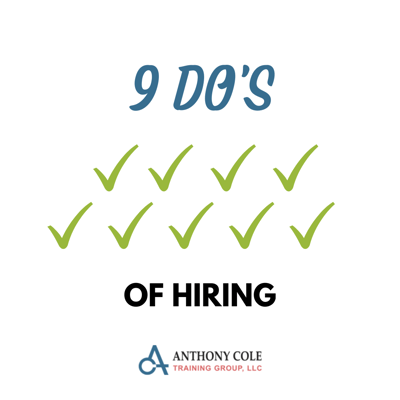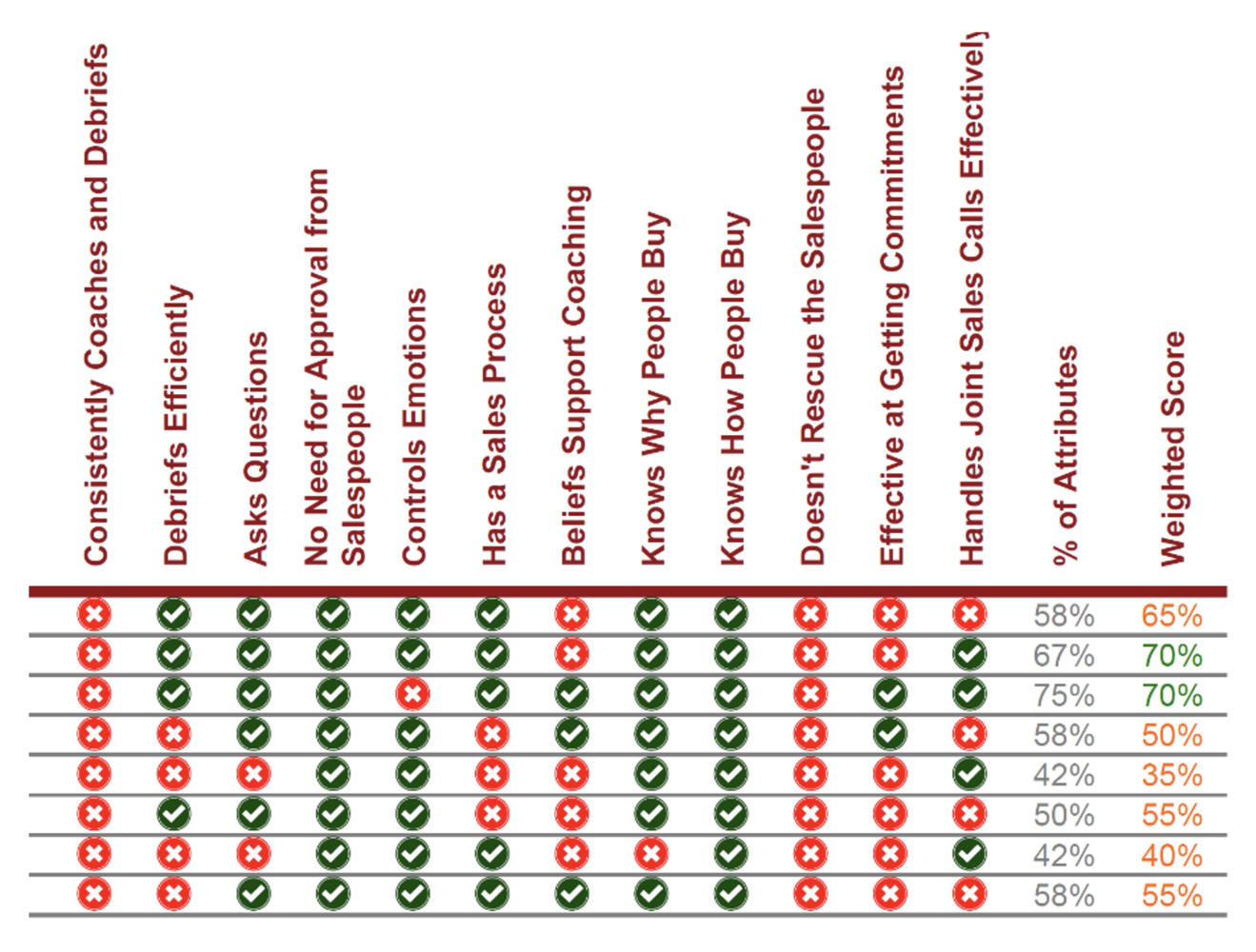I would like to provide you with an alternate perspective to LinkedIn's article- a list of 9 Do’s you can use when looking for and hiring new talent. Because we specialize in helping companies Sell Better, Coach Better, and Hire Better, my comments will focus specifically on sales but understand that these principles will apply for most hires in your company.
Linkedin Talent Solutions wrote this article focusing on the mistakes or “don'ts” of hiring talent. The Linkedin Talent Solutions 9 mistakes include:
- Your hiring team’s roles aren’t clearly defined
- Your job post isn’t clear or compelling enough
- You’re not targeting your job post to the right audience
- You’re not tapping into your personal LinkedIn network
- You’re not revealing what makes your company unique
- You ignored red flags during the interviews – the first interview should be based on what they must be great at
- You’re not getting to know the candidate
- Your evaluation criteria is unclear
- You don’t close the loop with all applicants
We have a Hire Better Salespeople program that helps our clients who are working to upgrade their sales teams. We train our clients on how to identify, and understand the importance of, people who are strong in the following areas:
- Hunting for new opportunities
- Relationship building
- Consultative selling
- Selling value
- Qualifying
- Presenting
- Closing
- Following a consistent sales process
- Managing accounts
- Farming opportunities
Using the LinkedIn article as a guide, I would like to provide you with an alternate perspective- a list of 9 Do’s you can use when looking for and hiring new talent. Because we specialize in helping companies Sell Better, Coach Better, and Hire Better, my comments will focus specifically on sales but understand that these principles will apply for most hires in your company.
1. Most companies don’t have a “hiring team”. They have people who, when the moment occurs, participate in some aspect of the hiring process. With that as the most common model, what we strongly suggest you do is:- Make sure the same people execute the same role, every time.
- Make sure the people you assign have the skills required for that role. For example, your interviewer must be willing to ask challenging questions, be able to disqualify candidates, have a great deal of healthy skepticism, etc.
- It works to disqualify candidates.
- Instead of selling the position, it states what the candidate is required to SUCCEED at rather than have experience doing (You will get people with the experience, but they probably have a failing experience). Have a list of “must haves”- must demonstrate the ability to, has a proven track record of, etc.
- In the case of salespeople, we would write the following in the job attraction post; “Must have a strong desire and commitment to be highly successful in selling in a very competitive market, selling high quality, high priced, non-tangible business solutions to prospects that are price-focused, difficult to get in front of, and tend to “shop around.” You must be very comfortable working in an environment where you are expected to manage yourself to success, undergo high pressure to hit goals and be coached by your manager to improve skills and change behaviors. During the interview, you will be expected to roleplay your outreach phone call and initial qualifying conversation with a prospect that already has a great relationship with the incumbent.”
4. Simply put, it makes sense to reach out to people you know. But make sure they know what you are looking for.
5. Make sure you look at other job postings in your space and commit yourself to writing something that would cause you (if you were a candidate looking for a TRANSFORMATIONAL career change) to think or say: “wow, now that’s a challenge, that’s something I need to investigate.” NOTE: Also, make sure your job attraction post scares off candidates just looking for a bigger payday or an opportunity to negotiate against their current employer. See #9.
6. To help you with RED flags, identify in advance what the candidate must be able to demonstrate they can do. For example:
- If they have to be great on the phone, your first interview step MUST be a phone interview.
- If they must be able to close on the phone, make sure they close for the next step during the phone interview.
- If you expect them to establish bonding and rapport on the first call, make them do that when they walk into the room for your first face-to-face interview. Make them do the hard work.
- If they must be great at asking questions, take note of the number and quality of questions they ask during the interview process (other than ones about compensation, vacation, CRM, benefits, etc).
It is also critical to identify in advance what you want to hear from your candidate:
- I have 30 new appointments a month. I’m passionate about success in sales because I have huge dreams and goals for myself and my… which require a lot of money.
- When I fail, it’s because of something I didn’t do.
- I make sure that I know the budget the prospect has before I ever present a solution.
I call on nothing but CEOs and Presidents.
Next, write down the questions you need to ask to get the answers you are looking for. What you should be looking for (link to sample pre-hire sales evaluation)
- Will to sell
- Sales DNA
- Sales competencies
7. Getting to know the real candidate can be misinterpreted as having a personal discussion with them to find out how likable they are. Too often candidates proceed through the interview process because interviewers “liked them”. Being likable is helpful but not as critical as willingness and ability to:
- Hunt for new business
- Qualify prospects by asking enough, and the right, questions
- Ability to call at the decision-making level
- Close for the next step
9. “Closing the loop” in our world means making sure the candidate is always closing for the next step. Make sure you completely define your decision-making process (like the one below) and gain an agreement to that process:
- Identify the candidate's compelling reason for looking at your opportunity.
- What are the monetary, and contractual considerations that have to be met?
- Deal with competition: Current employer, other opportunities they are considering, etc.
- Present everything there is to know about the opportunity and make sure that it is a career change the candidate would make if the monetary and contractual considerations were met
- Allow them to think it over before making your offer
- Make an offer that meets their criteria
- Ask them to decide once the offer is made
If you would like to attend a zoom meeting webinar to learn more about Hiring Better reply to this post, or email Alex Cole-Murphy, our Hiring Manager, at Alex@anthonycoletraining.com.





